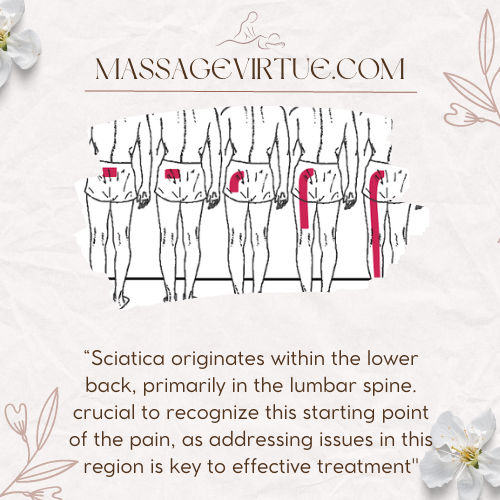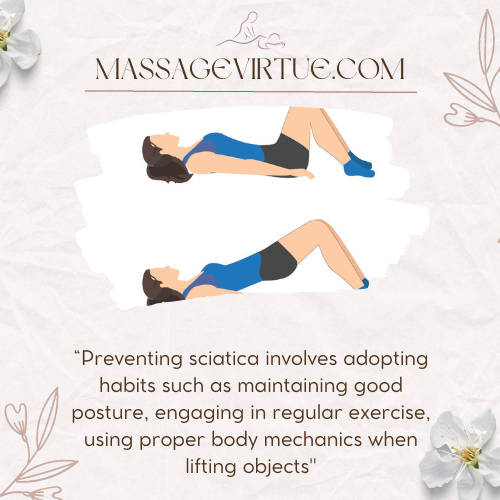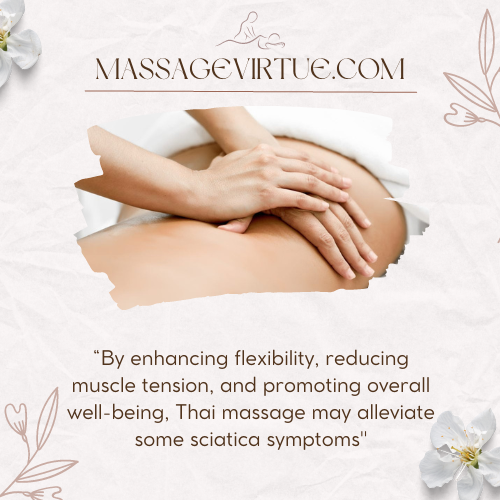Ever wondered if that blissful Thai massage you love could actually be the reason behind that nagging sciatica pain? Well, you’re not alone!
Today, we’re diving into the world of Thai massage to uncover whether it’s a friend or foe when it comes to sciatic nerve troubles.
No fancy jargon here, just a casual chat about the connection between Thai massage and sciatica. Let’s get to the bottom of this and keep things simple!
So, Can Thai Massage Really Cause Sciatica or Not?
The answer is no. There is no evidence to suggest that Thai massage itself is a direct cause of sciatica. In fact, Thai massage is often used as a complementary therapy to alleviate sciatic pain by reducing muscle tension and improving overall flexibility.
If you are experiencing sciatic pain after a Thai massage session, it is more likely due to a pre-existing condition or a technique applied during the massage.
However, it’s crucial to communicate any discomfort or medical conditions with your massage therapist to ensure they tailor the treatment to your specific needs and limitations.
All About Sciatica
Sciatica is a multifaceted condition, and understanding its intricacies is vital for effective management.
What Is Sciatica?
Sciatica, often misunderstood, is not a diagnosis itself but a symptom of an underlying issue. It occurs when the sciatic nerve, which runs from the lower back down each leg, becomes compressed or irritated.
This compression results in the distinctive pain that characterizes sciatica.
Where Does Sciatica Originate?
Sciatica originates within the lower back, primarily in the lumbar spine. It’s crucial to recognize this as the starting point of the pain, as addressing issues in this region is key to effective treatment.

What Can Trigger Sciatica?
Sciatica can be triggered by various factors including:
- Herniated discs
- Sitting too much
- Being overweight
- Wearing ill-fitting shoes or clothing
- Degenerative disc disease
- Smoking
- Bad posture
- Sedentary lifestyle
- muscle spasms
- Aging
- Spinal stenosis
- Bone Spur
- Pregnancy
- Injuries
- Nerve impingement
Identifying the underlying cause is crucial in determining the most appropriate treatment.
What Does Sciatica Pain Feel Like?
Sciatica pain is often described as sharp, shooting, or burning. Imagine a sudden, shooting pain that originates in the lower back and travels down the buttock and leg, sometimes accompanied by numbness or tingling.
How Long Does Sciatic Pain Last?
The duration of sciatic pain varies. It can be acute, lasting a few weeks, or become chronic, persisting for several months. Early intervention can mitigate symptoms and potentially prevent chronicity.
What Can Make Sciatic Pain Worse?
Certain factors can exacerbate sciatic pain, such as poor posture, lifting heavy objects incorrectly, or prolonged sitting. Recognizing and addressing these factors can aid in pain management and recovery.
How To Prevent Sciatica?
Preventing sciatica involves adopting habits such as maintaining good posture, engaging in regular exercise, using proper body mechanics when lifting objects, and taking breaks from extended periods of sitting.

These proactive measures significantly reduce the risk of developing sciatica.
What Is Thai Massage
Before examining the potential relationship between Thai massage and sciatica, it’s essential to understand what Thai massage entails.
Can Thai Massage Help Treat Sciatica?
Thai massage can serve as a complementary therapy for sciatica. By enhancing flexibility, reducing muscle tension, and promoting overall well-being, Thai massage may alleviate some sciatica symptoms when incorporated into a holistic treatment plan.

Sciatica Relief From Thai Massage
To harness the potential benefits of Thai massage for sciatica relief, it is crucial to consult a qualified therapist. They can tailor the massage to address specific areas of concern and provide a personalized treatment plan.
When combined with appropriate medical care and self-care practices, Thai massage can play a valuable role in managing and alleviating sciatic pain.
Conclusion
In conclusion, sciatica is a complex condition that can cause debilitating pain and discomfort. While Thai massage is generally considered safe and can be a valuable addition to a comprehensive treatment plan, it is not a standalone cure for sciatica.
Anyone experiencing sciatic pain should consult with a healthcare professional to determine the underlying cause and develop an appropriate treatment strategy.
When used in conjunction with medical guidance, Thai massage may offer relief and contribute to improved well-being for individuals suffering from sciatica.

